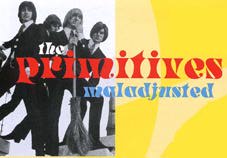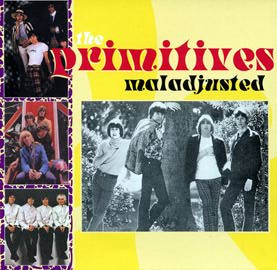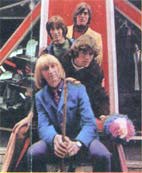 |
 |
|
|
|
|
|
|
|
|
|
|
LIKE MOST of their equally obscure mid-60s R&B/freakbeat brethren, THE PRIMITIVES are principally namechecked these days for the value - both in fiscal and artistic terms - of their vinyl legacy. Their trio of singles for the Pye label, the Italian-only album Blow Up and a unique-to-France EP currently have a combined value on the collectors circuit of over £1000, an accurate representation of their standing amongst freakbeat connoisseurs. But while their records have long been coveted by 60s collectors, the story of the Primitives has remained shrouded in mystery, with only vague rumours ci rc u lati ng about the relationship between the band's early UK career and their subsequent exploits in Italy.

Maladjusted rounds up their work during this 1964-67 period, featuring everything from those previously-mentioned releases plus an alternate version of the French EP's lead track, 'Oh Mary', the entire Blow Up album and a couple of related solo 45s from the group's long-term frontman Mal Ryder who, along with early fan John Taylor, has provided invaluable help in piecing together the legend of the band.
The Primitives evolved in 1964 out of British beat boom hopefuls The Cornflakes (previously known as The Rising Sons), whose typically cheesy post-Beatles handle didn't prevent them building up a sizeable fan base on the Oxford live circuit. As the Cornflakes, they won the Plaza Cinema beat group contest in Northampton, a competition that proved to be of twofold importance in their embryonic career: the contest's first prize was a two-year contract with the Pye label, while Cyd Cipin, who ran the local Plaza, was so impressed by the group that, in conjunction with his brother Mayer and their associate Leslie Jaffa, he became their manager.
A namechange to The Primitives gave a more accurate indication of the group's brand of long- haired , Pretty Things-styled driving R&B under their new name, they signed to Pye in autumn 1964. At this juncture, The Primitives' line-up consisted of lead vocalist Jay Roberts (real name Jeffrey Farthing), Geoff Eaton (aka Geoff Tindall) on lead guitar, the curiously-named John E. Soul (rhythm guitar, harmonica), RogerJames (bass) and Mike Wilding (drums).
|
|
The debut Primitives single, an archetypal British R&B assault on Sonny Boy Williamson's 'Help Me' backed by the similarly earthy group original 'Let Them Tell', duly appeared through Pye in November 1964 (it was also released in America on the Parkway label, trivia buffs). With bands like The Yardbirds and The Animals attracting commercial attention, there was no reason why 'Help Me' shouldn't receive similar acclaim, though a slighthy earlier cover version from Essex-based R&B group The Rebounds probabhy didn't help The Primitives' chances. Whatever the reason,'Help Me' failed to click, as did the even more frenetic Eaton/Tindall composition 'You Said' (b/w 'How Do You Feel'), released a couple of months later in January 1965 and apparently boasting the input of super- sessioneer guitarist Jimmy Page.
'You Said' is now regarded, in the words of Record Collector magazine, as "one of the toughest R&B tracks ever recorded", but it received few plaudits at the time. Nevertheless, The Primitives received valuable television exposure when their extrovert singer Jay Roberts had his hair cut live on Eamonn Andrews' chat show (a publicity angle also explored by one of the group's many R&B rivals, Davie Jones/Bowie and the Manish Boys, a month or two later) before the group launched into a blistering 'You Said'. Amused by such hirsute shenanigans, The Daily Mirror briefly ran a cartoon spoof of The Primitives and their hairy adventures, but such apparently priceless publicity and short-lived infamy failed to translate into chart success. By mid-1965, The Primitives seemed to be hapless passengers on British R&B's slow train to nowhere.
While The Primitives were experiencing the slings and arrows of outrageous fortune, a teenage rock'n'roll fan by the name of Paul Bradley Couling had been invited to rehearse with The Meteors, who also worked the Oxford iive circuit. Accepting their invitation, Couling quickly began to attract attention as The Meteors' frontman, and he was duly approached by prominent local band The Beatniks, whose lead singer Peter Cox had just been called up for National Service. Couling didn't need to think twice about accepting their offer: he left The Meteors, his job at the Southern Electricity Board, Oxford and his old identity behind. Adopting the stage name of Mal Ryder, he and his new colleagues - by now rechristened the Spirits moved north to Doncaster, appointing Martin Yale (who also handled Hull R&B band The Rats and Sheffield's Joe Cocker) as their manager.
Yale helped Mal Ryder and The Spirits find work in working men's clubs, but his influence was most apparent in brokering a recording deal. With the aid of future Tom Jones producer Peter Sullivan, two singles were cut both for Decca and Decca's Vocalion Pop labels: 'Cry Baby' / 'Take Over' (Decca F 11669, June 1963) and 'See The Funny Little Clown' / 'Slow Down' (Vocalion V 9219, May 1964). When these failed to garner attention, the band changed managers, the London-based David Stones setting in motion a move to Pye subsidiary Piccadilly. That led to the November 1964 release, 'Forget It' b/w 'Your Friend' (a Marty Wilde song), and a follow-up single - the Carter/Lewis composition 'Lonely Room' (also recorded by Carter/Lewis's own band, The Ivy League) backed by 'Tell Your Friend'appeared as a Mal Ryder solo single in April 1965.
Stones also arranged for the group to follow the well-worn UK/Germany export route, including a stint on the Storyville Club circuit that found The Spirits playing for up to six hours a night. Exhausted by their schedule, The Spirits fulfilled their contractual commitments in Germany before returning to England in spring 1965, when they promptly split up. As stressed as the rest of his former colleagues, Mal Ryder went back to work with his father on building sites, his hopes of pop stardom apparently over.
|
|
At this point, an equally disillusioned Primitives contacted Mal to ask if he'd be interested in joining them as frontman. He accepted on condition that the band was restructured to his own requirements. Only Roberts/Farthing (who by now had switched to bass and organ) and guitarist John E. Soul initially survived the cull, with Roger James leaving to form the Roger James Four, who immediately recorded two singles for the Columbia label (it's believed this is the same Roger James who wrote 'Shades Of Grey' for the Edwick Rumbold). Mal recruited former Spirits drummer Mick Charleton to the new line- up, but Soul's stay of execution was shortlived. Mal failed to tempt another former Spirit, guitarist Robert Wakely, away from his day job, but he was more successful in persuading Stuart Linnell to leave another local Northampton group, Dave Stone & The Saints, and join the new-look Primitives, who now fielded Ryder (vocals), Roberts (bass, organ), Linnell (lead guitar) and Charleton (drums).
With both Ryder and the Primitives already signed to Pye, it was only logical that their first single together should appear on the label. Released under the name of Mal & The Primitives, 'Every Minute Of Every Day' b/w 'Pretty Little Face' appeared in August 1965, with the lachrymose B side written by the now-departed John E. Soul (who, incidentally, worked in Cyd Cipin's Carnaby Street-style boutique in Northampton). 'Every Minute Of Every Day' attempted to scale down the abrasive R&B attack of the Primitives' first two singles into a more accessible, punchy mod sound.
But as with similarly-fashioned acts like the Fleur de Lys, the performance failed to reap its just commercial desserts despite an appearance on the long-running British TV show "Thank Your Lucky Stars" and a radio session for Brian Mathews' Saturday Club.
By this stage, The Primitives had moved to Northampton, where manager Cyd Cipin was based. The band rehearsed in Cipin's cinema, while he also rented the group a flat in Aroundle Street, an area that was due to be pulled down. "We were the only ones left in the street", Mal now recalls. "We had some great parties!". John Taylor, who visited the band on one or two occasions, remembers the front door of the group's flat had a sign that read "Beware Primitives"!
After working the usual Northern clubs, The Primitives spent January 1966 touring Norway where, according to Mal, they were received ecstatically. "They hadn't seen anything like us", he remembers. "We felt like the Beatles." This was to be the start of a European career that would dwarf their achievements back in England, though their relocation forced the group into further personnel changes. Stuart Linnell, the lead guitarist on 'Every Minute Of Every Day', pulled out: he was replaced by Dave Sumner (no relation to Gordon 'Sting' Sumner!), who'd bean playing the same German club circuit as the Spirits with Johnny Mike & The Shades. Mick Charleton's family commitments also forced him to withdraw, so The Primitives added a young Leicester-based drummer, David Withers, as a late minute replacement.

Withers "wasn't bad", according to Mal, but The Primitives were his first group, and his inexperienced showed. Still, he was quickly made to feel at home by his new colleagues, who nicknamed him Pick due to a perceived resemblance to a character in Dickens' Pickwick Popers.
After becoming the only group out of thirty candidates to pass an audition for the Piper Club in Italy, the revamped Primitives left England in spring 1966, playing at Montpellier in the south of France (a visit that coincided with the release of their French-only EP containing performances of the calibre of the jagged 'I Don't Feel Myself' and the explosive graunch of 'Mr Heartache'), the Alpine mountains of Chamonix and a one-off gig in Spain. By the summer, they'd arrived in Italy to start their residency at the Piper Club in Viareggio, where they mingled with other expatriates including The Sorrows (whose drummer, Bruce Finley, played in an early 70s Primitives line-up) and The Rokes.
Like many other bands who'd met with minimal success back in Blighty, The Primitives were treated as one of their own by the Italians. Recording for the Piper Club's own label (in association with RCA), the group scored heavily in December 1966 with the release of the single 'Yeeeeeeh!' (actually a version of the Young Rascals' 'I Ain't Gonna Eat My Heart Out Anymore'), backed with 'L'Ombra Di Nessuno', a similarly-retitled cover of the Four Tops' Motown classic, 'Standing In The Shadows Of Love', that began with a blatant Yardbirds cop. The slightly-disguised cover versions formula obviously worked, and Piper followed the success of 'Yeeeeeh!' with another well-received coupling of 'Incidente' (the Bar-Kays' instrumental 'Soul Finger' with newly-written Iyrics) and the moody 'Johnny No' (a cover of 'Thunder And Lightning'), all four performances revealing the group's newly- refined musical stance of hard-edged, soulish beat/R&B.
|
|
Suitably encouraged, Arc Piper Club released a Primitives album in 1967, artfully calling it "Blow Up" to cash in on Antonioni's immediately iconic Swinging London movie - despite the group's total lack of involvement with the film! The album was a curicusly-assembled collection that included three of their four Italian sides, a remake of the UK Pye single 'Every Minute Of Every Day', some appropriate covers including a full-throated 'Gimme Some Lovin' (Spencer Davis Group) and the US garage band anthem 'Cara-Lin' (also recorded by The Sorrows) together with a seemingly anomalous Charlie Rich song,'Mohair Sam' (also recorded by, er, Tom Jones). It was all grist to the mill, however, and even the less appropriate material was given a visceral sonic attack.
|
|
By this stage, it was increasingly clear that Mal was being singled out for pin-up status, and The Primitives effectively became their lead singer's backing band. Singles like an Italian language version of the Bee Gees song 'I've Gotta Get A Message To You' ('Pensiero D'Amore') reached the top of the Italian charts, selling a million copies in the process. Mal, in his own words, was elevated to the status of "the number one star in Italy at the end af the 60s and early 70s ... I made four films as an actor, took part in all the top Italian TV shows, was on the front cover of every magazine, gossip abaut my love life made the papers and I was getting mobbed everywhere. I worked at the Las Vegas Hilton Hotel and Madison Square Garden in New York, represented Italy in the Japanese Song Festival in Tokyo with a song I wrote, for which I received the Best Performer award. I've travelled the world and recorded my songs in many languages ... In the last few years, I've played the part of "Teen Angel" in the Italian theatre campany's production of the musical Grease "
The Primitives stayed with Mal until the early 70s, by which stage their line-up had gone through several changes. Pick Withers returned to England, playing with various low-profile progressive acts before finally hitting paydirt in the late 1970s with Dire Straits. His replacement in The Primitives, Scottish-born drummer Robbie Mcintosh, came to the group from the Brian Auger Trinity before going on to international success with the Average White Band, though he died at a tragically early age in 1974. A more pivotal Primitives member, Jay Roberts/Jeffrey Farthing, is also sadly no longer with us, having died of an overdose in the 1990s.
|
|
The late 60s line-up of the Primitives continued to contribute to Italian albums like "Sua Eccelenza" and "Mal Dei Primitives", but their musical output had become increasingly erratic. Sparkling psychedelic performances of 'Dear Mr. Fantasy', 'Race With The Devil' and the Small Faces track 'Song Of A Baker' were buried cheek-by-jowl alongside such mainstream fare as 'Love Letters In The Sand', 'Somewhere Over The Rainbow' and 'You'll Never Walk Alone' as Mal opted for the traditional showbiz route. For that reason, our anthology ends in 1967, thereby capturing both Mal and the Primitives during their mid-60s artistic apex, with fire in their teenage bellies and an unshakable commitment to the life-affirming qualities of raw, belligerent, adenoidal British R&B. Maladjusted? The Primitives?!? You'd better believe it. .
DAVID WELLS, November 2000
